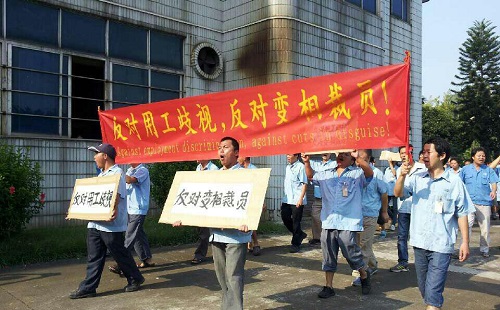Photo: China Labor Bulletin
Cuts in wages and the introduction of the new payment system came after the factory, previously owned by Taiwanese Lianzhong Stainless Steel, shifted hands to the state-owned Ansteel. In light of China’s past claim of socialism, it is, of course, ironic that cuts to worker’s benefits would occur after the factory shifted from private to state hands.
Indeed, during the strike itself, the state backed up factory owners with the deployment of riot police to prevent workers’ demonstrations from growing out of hand. The strike ended after the government threatened to arrest any worker who continued to strike. State cooperation with private industries occurs not only because of Communist party officials taking the opportunity to line their own pockets, but because the government as a whole prioritizes developmentalism in hopes of catching up with or out-performing western nations industrially.
Workers were at least able to secure the repeal of the new payment system, an early concession by factory owners on day 3 of the strike, which workers initially refused to take. It remains that disciplinary measures or legal actions may still be taken against strikers. Nevertheless, the strike has been seen as successful as a result of its ability to mobilize large numbers of workers.
As pointed out by China Labour Bulletin, the past year has seen a dramatic uptick in labor activity across China, with 2015 seeing twice as many strikes as in 2014. It would be slowing economic conditions which prompted increased workers’ struggles. The past month has also seen high labor activity because of demonstrations over unpaid wages before Lunar New Year’s, given that in some cases, the majority of a workers’ yearly income is paid to them before Lunar New Year’s. Demonstrations over unpaid wages appear to be especially common in the construction industry, with the past Lunar New Year seeing a shoe factory owner being chased out of the factory by his workers and the occupation of a restaurant in Guandong.
Nonetheless, if we see a particularly high amount of activity from the province of Guandong, we can attribute part of this to the strong labor NGOs which exist in Guandong, particularly in its capital city of Guangzhou. Labor NGOs sometimes fill the gap in China where official labor unions operate in collusion with factory owners.
As we see in the responses of the government to strikes across China, the state can and will intervene on behalf of the interests of the capital, with force if need be. In early December, twenty-five Guangzhou-based labor activists, including the heads of four labor NGOs, were arrested by the Chinese government on trumped up charges including corruption and embezzlement. Several, including high-profile labor activist Zeng Feiyang, are still under arrest.
The December arrest of labor activists was seen as a response to Guangzhou labor activism. Evidencing the large distance between the current Chinese state from its professed socialist rhetoric, this was a case of the Chinese state acting against workers and on behalf of the interests of capital by punishing labor activists.
It is ironic that in the present, we see under Xi Jinping’s presidency a claim to return to Maoist fundamentals, which claims to guarantee worker’s rights. Under Xi, we have seen an unprecedented crackdown on those perceived to be threats to social order, which includes labor activists. It would that in the present, the Chinese state acts on behalf of corporations, not workers.
Moreover, there is some evidence that the arrest of Guanzhou labor activists was out of anxiety that labor activists would hook up with “separatist” forces in nearby Hong Kong, seeing as several were participants in solidarity actions with Hong Kong’s 2014 Umbrella Movement.
Of course, such fears are likely unfounded when the Umbrella Movement was more directly a product of the unique particularities of Hong Kong’s relation to the Chinese mainland rather than indicating possible spillover of unrest into China itself. But the Chinese state is seeing threats everywhere these days. This is also the same logic behind arresting the “Feminist Five”, or human rights lawyers. What feminist activists, human rights lawyers, and labor activists threaten to do is to call attention to the gap between the Chinese government’s rhetorical claims of social equality and the reality of the Chinese government’s actions.
If the idea behind highly publicized arrests of leading labor activists is to probably aim to decapitate labor NGOs, as we see in the Ansteel strike, this has not prevented further demonstration in Guandong. But will we see a point in the near future in which the state moves to more direct confrontation with workers as a whole? If so, we will see what further responses ensue.
Brian Hioe (丘琦欣) has an M.A. in East Asian Languages and Cultures from Columbia University and is on the editorial board of New Bloom Magazine . Formerly a resident of Taipei, Taiwan, he is currently living in New York City and is an occasional translator and freelance writer on politics and social activism.










